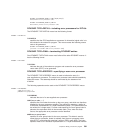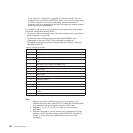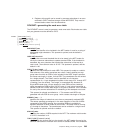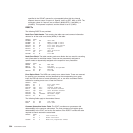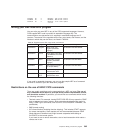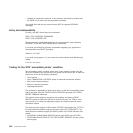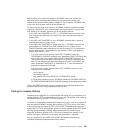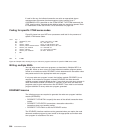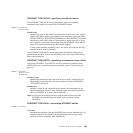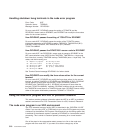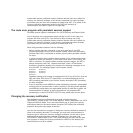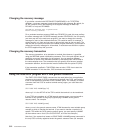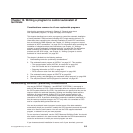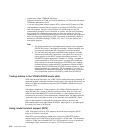DFHZNEPI TYPE=INITIAL—specifying the default routine
The DFHZNEPI TYPE=INITIAL macro specifies the name of the default
transaction-class routine to be used for the DFNZNEPI module.
DEFAULT=name
specifies the name of the default transaction-class routine to be used. A link is
made to this default routine if you specify for the transaction (using the CEDA
DEFINE PROFILE, CEDA DEFINE SESSIONS, or CEDA DEFINE TYPETERM
command) a NEPCLASS value of 0 (the default) or higher than 255, or if you
do not specify a transaction-class routine using the DFHZNEPI TYPE=ENTRY
macro for the class specified on the NEPCLASS operand.
If either of the preceding conditions is true, but you do not code the DEFAULT
operand, then no routine is invoked.
The DFHZNEPI TYPE=INITIAL macro must always be specified, and must be
placed before any other forms of the DFHZNEPI macro. Only one TYPE=INITIAL
macro can be specified.
DFHZNEPI TYPE=ENTRY—specifying a transaction-class routine
You use the DFHZNEPI TYPE=ENTRY macro to associate a transaction class
(NEPCLASS) with a transaction-class error handling routine. The format of this
macro is:
NEPCLAS=integer
specifies the transaction-class, and must be in the range 1 through 255. No
value should be specified that has been specified in a previous DFHZNEPI
TYPE=ENTRY instruction.
NEPNAME=name
specifies a name for the transaction-class routine to be associated with the
specified transaction-class. An error condition results if the name is specified
either as DFHZNEP, or is longer than 8 characters.
Note: You can use the sample node error program (with a name other than
DFHZNEP) as a transaction-class routine for the interface module,
DFHZNEPI.
DFHZNEPI TYPE=FINAL—terminating DFHZNEPI entries
TYPE=FINAL
completes the definition of module DFHZNEPI and must be specified last. The
assembly should be terminated by an END statement with no entry name
specified, or by the statement: END DFHZNENA.
DFHZNEPI TYPE=INITIAL
[,DEFAULT=name]
DFHZNEPI TYPE=ENTRY
,NEPCLAS=integer
,NEPNAME=name
DFHZNEPI TYPE=FINAL
Chapter 9. Writing a node error program 509



